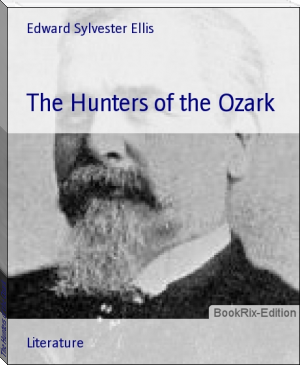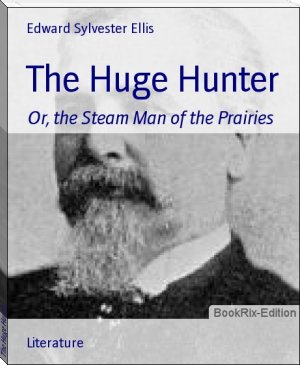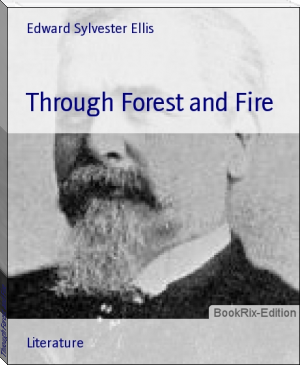The Hunters of the Ozark - Edward Sylvester Ellis (children's ebooks online .txt) 📗

- Author: Edward Sylvester Ellis
Book online «The Hunters of the Ozark - Edward Sylvester Ellis (children's ebooks online .txt) 📗». Author Edward Sylvester Ellis
Deerfoot pointed to the gun lying on the ground, where it had been left by the Wolf.
"That belongs to my brother."
The delighted Terry could hardly believe what was told him, and he stood looking doubtfully at Deerfoot, as if suspecting he had heard him amiss.
"It was you who captured the gun, Deerfoot, and so, if it belongs to any one, ye are the spalpeen."
The Shawanoe looked down at his own handsome weapon and shook his head. He had no need of any other weapon. Besides, this singular youth could not have conscientiously taken it. He did not feel justified in keeping it for his own use, no matter if in sore need of such a weapon; but, since the Winnebago had made his demonstration against Terry Clark, and was compelled to leave the gun behind, when he was permitted to go, it seemed proper that the prize should fall into the hands of the Irish lad.
What gave special propriety to the act was the fact that, although Fred Linden was the owner of a fine gun, Terry had none. When his father lost his life, his rifle was never recovered, and though there was one in the family of MacClaskey, the youth had no claim upon it. He longed for such a weapon, with a longing that it would be hard to understand. The prize, therefore, was appreciated to its full value. He picked it up with an embarrassed grin, which quickly became natural when he turned it over in his hands and saw what an excellent piece it was.
"More than likely it belonged to a white man in the first place," said Fred; "so it is right enough that it should come back to one of his own race."
"It's loaded," said Terry, slightly raising the hammer and noticing the powder in the pan. Then he brought the gun to his shoulder and pointing it at the white trunk of the beech, which partly showed through the intervening branches and undergrowth, he said:
"If the spalpeen should peep out from behind that tree, I'm thinkin' I could hit him a harder blow than when I landed me two fists on his mug."
"The Winnebago is a long ways off," said Deerfoot, with a shake of his head; "he may meet my brother some day, but it will not be in this place."
The young Shawanoe having learned all that was to be learned about his young friends, now reached his hand in the breast of his hunting shirt and drew out a small, closely-printed Bible, from between the leaves of which he took a piece of paper that had been folded several times. He glanced at the superscription, as if to make sure it was right, and then handed it to Fred, who, as may be supposed, took it with astonishment. He recognized the penciled writing as that of his father.
Parting the folds, he read the following:
MY DEAR FRED:
You know that when we left home there were three of us, Hardin,
Bowlby and myself. There are three of us still, but Bowlby
considers himself of no account for some weeks to come, because of
a hurt to his foot which will prevent his getting around for a long
time. Such being the case, I have concluded, now that I have the
chance, to send for you to join us. You are old enough and strong
enough to make a full hand, and you can give us good help. Since we
have all the animals, you will come afoot, but you will find no
trouble in keeping to the trail, which has been traveled often
enough to make it plain. It is no more than a hundred miles from
Greville to our camp at the foot of the Ozark Mountains, so you
ought to have no difficulty in reaching here in the course of three
or four days. Love to your mother and Edith.
I send this by a young Shawanoe warrior, called Deerfoot. He is the
most remarkable Indian I ever knew. I shall have a good deal to
tell you about him when you reach here.
YOUR FATHER.
"Deerfoot bids his brothers good-by," said the young Indian, offering his hand, when he saw Fred had finished reading his letter; "he hopes that he shall see them again."
"It won't be our fault if he doesn't," was the cordial response of Fred Linden, in which Terry heartily joined him. After a few more pleasant words they parted, Deerfoot following in the footsteps of the fleeing Winnebago, while the others moved to the northward in the direction of the creek. They turned aside a little from the direct course so as to hunt for Brindle, that Fred had seen, but she was not found. To their delight, however, they saw her footprints on the edge of the creek, proving that she had gone home with the directness of one who felt remorse for wandering from the straight path. She had swum the stream, and was doubtless before the MacClaskey cabin at that moment.
But standing close to the edge of the creek, the boys became aware of a hard fact: it had not only risen with great rapidity during the last half hour, so as to become a rushing torrent, but it was still rising so fast that it was extremely dangerous for the boys to try to cross it in the canoe. Indeed, they hesitated to make the attempt, but finally concluded to do so.
CHAPTER VII.
THE HUNTERS OF OZARK.
I must tell you how it was that Deerfoot the Shawanoe came to bring the important letter of George Linden to his son Frederick.
It has already been stated that it was the custom of a party of hunters and trappers to leave the settlement of Greville in the autumn of each year and spend most of the cold weather among the streams at the foot of a certain part of the Ozark Mountains. At that period, the fur bearing animals abounded in the section, as they were found in hundreds of other portions of the vast area known under the general name of the Louisiana Territory. You must bear in mind that there were thousands of square miles that had not been trodden by a white man, and so sparse were the Indian villages that large portions of the country remained to be visited even by them.
Beaver, otter, foxes, bears, and buffaloes were the chief animals that were afterward driven west by the advancing tide of civilization, until the agents of the Missouri and Western Fur Companies were forced to do most of their work in the far west and north-west, where they came in collision with that vast monopoly known as the Hudson Bay Company, which, until recent years, not only trapped and hunted throughout Oregon, but along the Pacific coast as far south as California.
George Linden, Rufus Hardin and James Bowlby composed the party who, in the autumn of the year of which I am writing, rode each a horse a hundred miles to the south of the frontier settlement of Greville, and pitched their tent at the foot of the Ozark range. Beside the animals ridden, each hunter took a pack-horse to help bring back the peltries that were to be gathered during the cold weather. As a matter of course, they were provided with guns and plenty of munitions, and indeed with every necessity for their limited wants. They had spent several winters there and knew what was before them. They had hunted and trapped for years in other parts of the great west, and more than once had made the long journey to the post of St. Louis to dispose of their furs, a necessity that, as I have explained, was removed by the annual visit of the agents with their long train of pack-horses to gather up the peltries.
And so, without giving any of the interesting particulars of the ride southward from Greville, let us take a look at the little party gathered at their primitive camp in the wild Ozark region.
The six horses had been relieved of their burdens on reaching the place, and were turned loose to crop the grass that was plentiful in many places. Although there was snow now and then through the winter, there was hardly enough to cause any suffering on the part of the animals. When the storms, however, were violent or prolonged, the hardy beasts were provided with some of the stores of dried grass that was kept in stock, as may be said. In case that gave out they could make shift with the cottonwood and other trees, whose bark was not lacking in succulent qualities.
Although a tolerable shelter could have been found in any one of the numerous caves within reach, the hunters preferred to erect a rough cabin, that was almost strong enough to withstand a cyclone. The keen axes enabled them to trim off the interfering limbs, and they were joined at the corners so well that very little, if any, rain or snow could force its way through. Other logs and branches were laid across the top and ends fastened to the logs beneath by means of withes, so that the roof was not likely to be carried away unless the cabin itself went with it.
On the top of the roof was a thick layer of branches and leaves, packed so closely that little moisture could find its way through. There were no windows, for none was needed. The single door in front was large enough to allow free egress and ingress. At night, when there was a possibility that some curious wild animal might come snuffing around, the door was closed by means of a framework of thick limbs, also fastened together with withes, swinging on leathern hinges, and made secure by a brace leaning against it from the inside.
Within this structure were stored their supplies, and the blankets on which they slept were spread upon the bare ground. Their slumber was sweeter, too, than it would have been had they stretched themselves on "downy beds of ease," for health and weariness are two soporifics which art can never supplant.
The traps and appurtenances used in their toil were never taken away from the place, for there was no call to do so. Such repairs as were needed from time to time were made in the cabin or on the spot, as the necessity arose. The rifles, of course, furnished the food needed, while an abundance of fish could be taken at any time from the streams in the neighborhood.
A diet solely of flesh and fish is not acceptable to any one. Therefore, among the supplies annually brought to the cabin, were a quantity of coarse flour, meal, sugar, coffee, salt and tea. It may be said, that in one respect they were like modern campers out, except that they took the wrong season of the year for what so many boys consider the acme of enjoyment.
There was little in the appearance of the three men to call for special description. All were in middle life, strong, rugged, and
"That belongs to my brother."
The delighted Terry could hardly believe what was told him, and he stood looking doubtfully at Deerfoot, as if suspecting he had heard him amiss.
"It was you who captured the gun, Deerfoot, and so, if it belongs to any one, ye are the spalpeen."
The Shawanoe looked down at his own handsome weapon and shook his head. He had no need of any other weapon. Besides, this singular youth could not have conscientiously taken it. He did not feel justified in keeping it for his own use, no matter if in sore need of such a weapon; but, since the Winnebago had made his demonstration against Terry Clark, and was compelled to leave the gun behind, when he was permitted to go, it seemed proper that the prize should fall into the hands of the Irish lad.
What gave special propriety to the act was the fact that, although Fred Linden was the owner of a fine gun, Terry had none. When his father lost his life, his rifle was never recovered, and though there was one in the family of MacClaskey, the youth had no claim upon it. He longed for such a weapon, with a longing that it would be hard to understand. The prize, therefore, was appreciated to its full value. He picked it up with an embarrassed grin, which quickly became natural when he turned it over in his hands and saw what an excellent piece it was.
"More than likely it belonged to a white man in the first place," said Fred; "so it is right enough that it should come back to one of his own race."
"It's loaded," said Terry, slightly raising the hammer and noticing the powder in the pan. Then he brought the gun to his shoulder and pointing it at the white trunk of the beech, which partly showed through the intervening branches and undergrowth, he said:
"If the spalpeen should peep out from behind that tree, I'm thinkin' I could hit him a harder blow than when I landed me two fists on his mug."
"The Winnebago is a long ways off," said Deerfoot, with a shake of his head; "he may meet my brother some day, but it will not be in this place."
The young Shawanoe having learned all that was to be learned about his young friends, now reached his hand in the breast of his hunting shirt and drew out a small, closely-printed Bible, from between the leaves of which he took a piece of paper that had been folded several times. He glanced at the superscription, as if to make sure it was right, and then handed it to Fred, who, as may be supposed, took it with astonishment. He recognized the penciled writing as that of his father.
Parting the folds, he read the following:
MY DEAR FRED:
You know that when we left home there were three of us, Hardin,
Bowlby and myself. There are three of us still, but Bowlby
considers himself of no account for some weeks to come, because of
a hurt to his foot which will prevent his getting around for a long
time. Such being the case, I have concluded, now that I have the
chance, to send for you to join us. You are old enough and strong
enough to make a full hand, and you can give us good help. Since we
have all the animals, you will come afoot, but you will find no
trouble in keeping to the trail, which has been traveled often
enough to make it plain. It is no more than a hundred miles from
Greville to our camp at the foot of the Ozark Mountains, so you
ought to have no difficulty in reaching here in the course of three
or four days. Love to your mother and Edith.
I send this by a young Shawanoe warrior, called Deerfoot. He is the
most remarkable Indian I ever knew. I shall have a good deal to
tell you about him when you reach here.
YOUR FATHER.
"Deerfoot bids his brothers good-by," said the young Indian, offering his hand, when he saw Fred had finished reading his letter; "he hopes that he shall see them again."
"It won't be our fault if he doesn't," was the cordial response of Fred Linden, in which Terry heartily joined him. After a few more pleasant words they parted, Deerfoot following in the footsteps of the fleeing Winnebago, while the others moved to the northward in the direction of the creek. They turned aside a little from the direct course so as to hunt for Brindle, that Fred had seen, but she was not found. To their delight, however, they saw her footprints on the edge of the creek, proving that she had gone home with the directness of one who felt remorse for wandering from the straight path. She had swum the stream, and was doubtless before the MacClaskey cabin at that moment.
But standing close to the edge of the creek, the boys became aware of a hard fact: it had not only risen with great rapidity during the last half hour, so as to become a rushing torrent, but it was still rising so fast that it was extremely dangerous for the boys to try to cross it in the canoe. Indeed, they hesitated to make the attempt, but finally concluded to do so.
CHAPTER VII.
THE HUNTERS OF OZARK.
I must tell you how it was that Deerfoot the Shawanoe came to bring the important letter of George Linden to his son Frederick.
It has already been stated that it was the custom of a party of hunters and trappers to leave the settlement of Greville in the autumn of each year and spend most of the cold weather among the streams at the foot of a certain part of the Ozark Mountains. At that period, the fur bearing animals abounded in the section, as they were found in hundreds of other portions of the vast area known under the general name of the Louisiana Territory. You must bear in mind that there were thousands of square miles that had not been trodden by a white man, and so sparse were the Indian villages that large portions of the country remained to be visited even by them.
Beaver, otter, foxes, bears, and buffaloes were the chief animals that were afterward driven west by the advancing tide of civilization, until the agents of the Missouri and Western Fur Companies were forced to do most of their work in the far west and north-west, where they came in collision with that vast monopoly known as the Hudson Bay Company, which, until recent years, not only trapped and hunted throughout Oregon, but along the Pacific coast as far south as California.
George Linden, Rufus Hardin and James Bowlby composed the party who, in the autumn of the year of which I am writing, rode each a horse a hundred miles to the south of the frontier settlement of Greville, and pitched their tent at the foot of the Ozark range. Beside the animals ridden, each hunter took a pack-horse to help bring back the peltries that were to be gathered during the cold weather. As a matter of course, they were provided with guns and plenty of munitions, and indeed with every necessity for their limited wants. They had spent several winters there and knew what was before them. They had hunted and trapped for years in other parts of the great west, and more than once had made the long journey to the post of St. Louis to dispose of their furs, a necessity that, as I have explained, was removed by the annual visit of the agents with their long train of pack-horses to gather up the peltries.
And so, without giving any of the interesting particulars of the ride southward from Greville, let us take a look at the little party gathered at their primitive camp in the wild Ozark region.
The six horses had been relieved of their burdens on reaching the place, and were turned loose to crop the grass that was plentiful in many places. Although there was snow now and then through the winter, there was hardly enough to cause any suffering on the part of the animals. When the storms, however, were violent or prolonged, the hardy beasts were provided with some of the stores of dried grass that was kept in stock, as may be said. In case that gave out they could make shift with the cottonwood and other trees, whose bark was not lacking in succulent qualities.
Although a tolerable shelter could have been found in any one of the numerous caves within reach, the hunters preferred to erect a rough cabin, that was almost strong enough to withstand a cyclone. The keen axes enabled them to trim off the interfering limbs, and they were joined at the corners so well that very little, if any, rain or snow could force its way through. Other logs and branches were laid across the top and ends fastened to the logs beneath by means of withes, so that the roof was not likely to be carried away unless the cabin itself went with it.
On the top of the roof was a thick layer of branches and leaves, packed so closely that little moisture could find its way through. There were no windows, for none was needed. The single door in front was large enough to allow free egress and ingress. At night, when there was a possibility that some curious wild animal might come snuffing around, the door was closed by means of a framework of thick limbs, also fastened together with withes, swinging on leathern hinges, and made secure by a brace leaning against it from the inside.
Within this structure were stored their supplies, and the blankets on which they slept were spread upon the bare ground. Their slumber was sweeter, too, than it would have been had they stretched themselves on "downy beds of ease," for health and weariness are two soporifics which art can never supplant.
The traps and appurtenances used in their toil were never taken away from the place, for there was no call to do so. Such repairs as were needed from time to time were made in the cabin or on the spot, as the necessity arose. The rifles, of course, furnished the food needed, while an abundance of fish could be taken at any time from the streams in the neighborhood.
A diet solely of flesh and fish is not acceptable to any one. Therefore, among the supplies annually brought to the cabin, were a quantity of coarse flour, meal, sugar, coffee, salt and tea. It may be said, that in one respect they were like modern campers out, except that they took the wrong season of the year for what so many boys consider the acme of enjoyment.
There was little in the appearance of the three men to call for special description. All were in middle life, strong, rugged, and
Free e-book «The Hunters of the Ozark - Edward Sylvester Ellis (children's ebooks online .txt) 📗» - read online now
Similar e-books:





Comments (0)